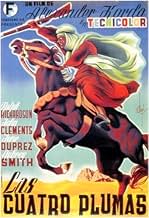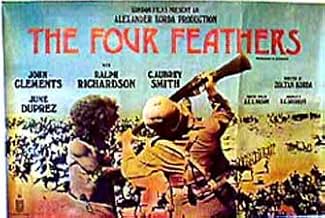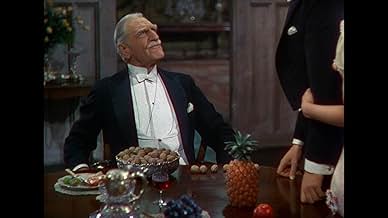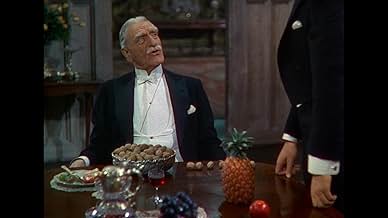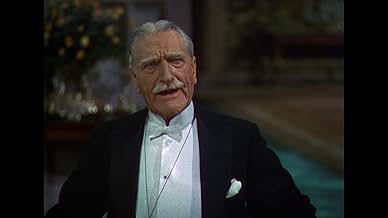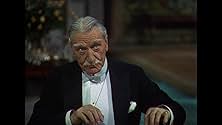Un tímido oficial británico renuncia y quema su citación el último día antes de una guerra en Sudán. Llamándolo cobarde, su novia y 3 amigos le dan una pluma blanca. Para redimirse, sigue a ... Leer todoUn tímido oficial británico renuncia y quema su citación el último día antes de una guerra en Sudán. Llamándolo cobarde, su novia y 3 amigos le dan una pluma blanca. Para redimirse, sigue a sus amigos a la guerra para salvarles la vida.Un tímido oficial británico renuncia y quema su citación el último día antes de una guerra en Sudán. Llamándolo cobarde, su novia y 3 amigos le dan una pluma blanca. Para redimirse, sigue a sus amigos a la guerra para salvarles la vida.
- Dirección
- Guionistas
- Elenco
- Premios
- 1 premio ganado y 2 nominaciones en total
- Man
- (sin créditos)
Opiniones destacadas
June Duprez is the scornful woman, pretty as a picture in the only feminine role. Uncharismatic British actor John Clements is only adequate as the man who receives the "four feathers" and must redeem himself--but Ralph Richardson has the most memorable scenes as the sun-struck soldier who loses his helmet under the blazing sun and is blinded. Many gripping scenes as the hero undertakes a long journey to the Sudan.
Handsome Alexander Korda production rightfully deserves its ranking as a screen classic of 1939, but I have to say it's not without its faults as far as the structure of the story goes.
First of all, too much time is spent on hundreds of extras in battle scenes that become repetitious after awhile and interrupt the flow of the story and what is happening with our hero. Furthermore, the actor chosen for the "stiff upper lip" role of Haversham is John Clements, and much of his performance is too stiff to come alive. A more appealing and charismatic actor from that era would have sufficed and made the story stronger. Thirdly, there's a hint of incredibility in the tale of a man who would go to such extremes to regain his honor and go on a mission in which he would be reunited with the very men who scorned him. A bit much in the realm of credibility, but it does make a good story.
Summing up: Good adventure tale in which C. Aubrey Smith has one of his most memorable character roles as a stuffy "Colonel Blimp" type of career soldier recounting his favorite war tales.
The film celebrates friendship and mutual obligation. It celebrates courage and determination. It celebrates a beautiful young couple and the love that conquers all, and celebrates the fact that the movies never let the funny-looking guy get the girl. It celebrates C. Aubrey Smith's eyebrows, and that's reason enough to watch any film.
The real heroes are Ralph Richardson, for acting at least 100% in every scene, never coasting or losing concentration for a minute, and the euphoniously named Osmond Borrodaile, whose second unit cinematography in faraway locations with monstrous cameras under difficult conditions enlivened many a movie.
I believe that the main reason this film is not given more credit is that it happened to be made in the watershed year of 1939, a year of legendary films, filmmakers, and stars. (Think "Gone with the Wind" and "The Wizard of Oz", among others.) The action scenes are as good as you can get. The technical direction is well done and the cinematography excellent. While the camaraderie is, at times, a little forced, it is probably fairly accurate.
The travails of the protagonist are straightforward and unimpeded by the burdens of political overtones or ethereal punishments for current retrospections on political transgressions and apologetic political correctness. I'll forego the 5.1 surround sound for the far better entertainment factor of the real "Four Featers" made in 1939
The Technicolor photography is eye-poppingly rich, at the same level as three other 1939 color classics—namely, Gone with the Wind, The Wizard of Oz and Drums Along the Mohawk. Particularly effective are the transitions from the browns and yellows of North African military outposts, with their punctuations by the red, white and blue of the Union Jack, to the deep greens of rural England. To top it off, much of the film was actually shot in the Sudan with what seems like thousands of native extras. By looks alone, sometimes it's hard to believe that this production predates the Second World War. It might have been a huge hit if it had had a Cary Grant or a Clark Cable or an Errol Flynn in the lead. As things go, John Clements is as good as can be, if not exactly bursting with charisma. Ralph Richardson gives a bravura performance as Clement's fellow officer, though he is saddled with a sequence that strains credulity beyond the breaking point. Let's just say that it takes a physically fit man longer than 30 seconds of direct exposure to the desert sun before he suffers total disorientation and unconsciousness. And if the sun can do that much damage so swiftly, then surely the flesh of the unconscious man's face, exposed for hours, would be cooked to a cinder.
C. Aubrey Smith plays his usual crusty old Brit, this time as a bombastic Crimean War veteran who complains that men are no longer men and war is no longer war. His repetitious boasting wears thin after a while. June Duprez barely registers as the female love interest.
¿Sabías que…?
- TriviaDirector Zoltan Korda's own remake of this film, Storm Over the Nile (1955), re-used a lot of the battle sequences from this movie, which did not lend themselves very well to the cropping necessary to achieve the width of the CinemaScope ratio, nor did their comparative fuzziness blend well with the new footage.
- ErroresWhen General Burroughs is talking in the garden with Ethne, his swagger stick reverses ends.
- Citas
Harry Faversham: In England, the white feather is the mark of a coward.
Dr. Harraz: Ah, I see. Then why worry? Be a coward and be happy.
Harry Faversham: No, Doctor. I have been a coward, and I wasn't happy.
- Créditos curiososOpening credits prologue: In 1885 the rebellious army of cruel dervishes enslaved and killed many thousands of defenceless natives in the Sudan, then laid siege to Khartoum. The scanty garrison's heroic commander, General Gordon appealed for help from England - but no help reached him.
- ConexionesEdited into Storm Over the Nile (1955)
- Bandas sonorasAuld Lang Syne
(1788) (uncredited)
Lyrics by Robert Burns, music traditional
Heard during the departure of the Regiment
Selecciones populares
- How long is The Four Feathers?Con tecnología de Alexa
- Why is this film not available in the original 130 minute release length, always cut down to 115 minutes?
- Why is this film not available in the original 130 minute release length, always cut down to 115 minutes?
Detalles
- Tiempo de ejecución2 horas 9 minutos
- Relación de aspecto
- 1.37 : 1
Contribuir a esta página



